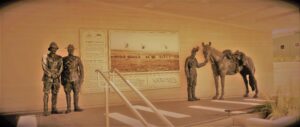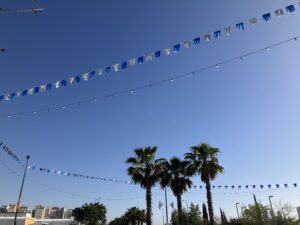Yeshua specifically promised us that “In this world you will have trouble” (John 16:33). The question is not whether we will experience difficulties, but what how we respond when we find ourselves in a pickle.
Habakkuk was a man in a tight spot. His book is one of angst and woe, desperately seeking God’s help in times of trouble. But after outlining all the desperate straits that he and his countrymen are in, he ends on an extremely interesting and unusual note. The last verse says this:
“God, the Lord, is my strength, and He makes my feet like hinds’ feet, and He makes me to walk upon my high places.
For the choirmaster. With my string-music.”
“For the choirmaster. With my string-music.” Nowhere else in the Bible is this phrase found except at the beginning of Psalms. It seems to be in the wrong place. Why does he say that, right at the end? The clue might be in the Hebrew meaning of the word we translate as “choirmaster”…
In the Hebrew, the word for choirmaster, מנצח (menatzeach) is a very interesting one
The root word is נצח which also is connected to ideas of eternity (netzach) and victory (nitzachon). It can also mean to shine or be bright, to be perpetual, famous or lead. It is this last sense in which we understand that Habakkuk is referring to a leader of music. Another clue we have is that the sentence beforehand is mentioned two other times in the Bible; once in Psalm 18, when David sings of his need and his trust that God will rescue him from his enemies. The second time it appears is in 2 Samuel 22, which is that same Psalm, written in the context of the unfolding history of Saul and David’s difficult story.
Habakkuk refers back to David’s song of confidence in God, written in times of trouble. Both he and David have understood the importance of the kind of trust that can sing and make music in praise to God, even while the situation looks bleak.
David begins his Psalm by addressing the choirmaster or leader (the menatzeach) and sets out to praise with song, declaring his certainty in God’s victory on his behalf. Habakkuk ends with that idea, and adds “with my stringed instruments” or “string-music”, for praise can be at its most powerful when sung in the dark, and most terrifying to the enemy.
In contrast with what some people imagine, God does not demand our praises because he is insecure or a megalomaniac – rather it is rightful, fitting, and lifts our eyes to where our help comes from. In praise, our resolve can be strengthened and our confidence in God is boosted, as we remember who He is and what He can do. Our hearts can become full again of gratitude instead of anxiety and fear, and gratitude is one of the best weapons that there is against temptation and the victim mentality which leads us into a sense of wrongful entitlement. Our faith can rise, and our willingness to wait patiently for God’s help expands. Instead of slipping into idolatry as we grasp at straws, we once again see our good Father God, and put our hand safely in his.
It was not for nothing that God appointed worshipers to lead into battle. It is no coincidence that the idea of the word for the leader of worship is connected with victory. When we find ourselves in trouble and cannot see our way out, we can join David and Habakkuk in confidently singing songs of praise and trust in the dark, that God will overcome our enemies and ultimately lead us out in victory.
















